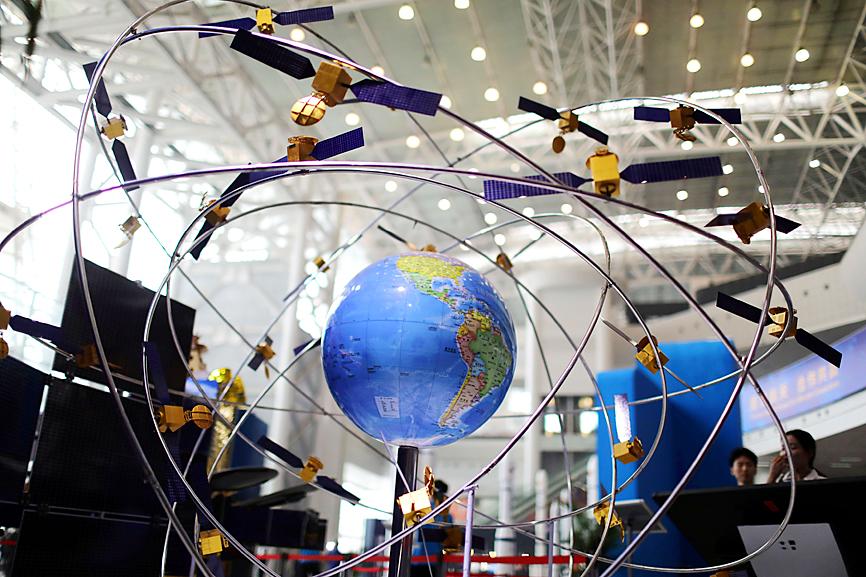A plan by a group of Chinese military and business institutions to invest US$471 million to set up a venture capital fund aims to secure high-end military technology by circumventing US sanctions, a defense expert said on Friday.
The plan shows Beijing’s ambitions to cultivate a domestic military supply chain at a time when it has stepped up its threats against Taiwan, said Yang I Kwei (楊一逵), a researcher at the Institute for National Defense and Security Research, a think tank affiliated with the Ministry of National Defense.
Yang’s comments came after Guangzhou Haige Communications Group (廣州海格通信集團), which provides communications and navigation equipment to the Chinese military, on April 7 announced that it would partner with China Poly Group (中國保利集團公司) and other entities to set up a venture capital fund, valued at 3 billion yuan (US$471 million), for the development of military equipment.

Photo: Reuters
Haige Communications, whose predecessor was a military ordnance factory, counts China’s army, navy and air force among its customers, and has participated in the development of the BeiDou Satellite Navigation System.
It is an important supplier of war simulation and pilot training systems to the Chinese military, Yang said.
China Poly is among 102 state-owned enterprises under the supervision of the Chinese Assets Supervision and Administration Commission.
It has served as an importer and exporter of military equipment for China, Yang said.
Participants in the planned venture fund have close ties with Chinese authorities, he said, adding that China Poly is one of its largest controlling institutions.
Poly Technologies (保利科技有限公司), a subsidiary of China Poly, is the largest state-owned supplier of military equipment, missile technologies and drones to the Chinese military, Yang said.
The planned fund is expected to serve as a platform for the Chinese military to enhance its technology competition with the US, which could help Beijing skirt Washington’s sanctions and even secure technology from the US, he said.
The COVID-19 pandemic, US sanctions against Beijing and Russia’s invasion of Ukraine has prompted many venture capitalists to flee Asia, Yang said.
Chinese authorities likely want the planned fund to re-energize the domestic capital venture market, and boost information and communications development in a bid to commercialize technology, he said.
The Chinese military’s efforts in information and communications technology development could enhance Beijing’s supervision and control of personal information and pose a larger threat to democracies, he added.

Taiwan has received more than US$70 million in royalties as of the end of last year from developing the F-16V jet as countries worldwide purchase or upgrade to this popular model, government and military officials said on Saturday. Taiwan funded the development of the F-16V jet and ended up the sole investor as other countries withdrew from the program. Now the F-16V is increasingly popular and countries must pay Taiwan a percentage in royalties when they purchase new F-16V aircraft or upgrade older F-16 models. The next five years are expected to be the peak for these royalties, with Taiwan potentially earning

STAY IN YOUR LANE: As the US and Israel attack Iran, the ministry has warned China not to overstep by including Taiwanese citizens in its evacuation orders The Ministry of Foreign Affairs (MOFA) yesterday rebuked a statement by China’s embassy in Israel that it would evacuate Taiwanese holders of Chinese travel documents from Israel amid the latter’s escalating conflict with Iran. Tensions have risen across the Middle East in the wake of US and Israeli airstrikes on Iran beginning Saturday. China subsequently issued an evacuation notice for its citizens. In a news release, the Chinese embassy in Israel said holders of “Taiwan compatriot permits (台胞證)” issued to Taiwanese nationals by Chinese authorities for travel to China — could register for evacuation to Egypt. In Taipei, the ministry yesterday said Taiwan

‘LIKE-MINDED PARTNER’: Tako van Popta said it would be inappropriate to delay signing the deal with Taiwan because of China, adding he would promote the issue Canadian senators have stressed Taiwan’s importance for international trade and expressed enthusiasm for ensuring the Taiwan-Canada trade cooperation framework agreement is implemented this year. Representative to Canada Harry Tseng (曾厚仁) in an interview with the Central News Agency (CNA) said he was increasingly uneasy about Ottawa’s delays in signing the agreement, especially as Ottawa has warmed toward Beijing. There are “no negotiations left. Not only [is it] initialed, we have three versions of the text ready: English, French and Mandarin,” Tseng said. “That tells you how close we are to the final signature.” Tseng said that he hoped Canadian Prime Minister Mark Carney

POSITIVE DEVELOPMENT: Japan and the US are expected to hold in-depth discussions on Taiwan-related issues during the meeting next month, Japanese sources said The holding of a Japan-US leaders’ meeting ahead of US President Donald Trump’s visit to China is positive news for Taiwan, former Japan-Taiwan Exchange Association representative Hiroyasu Izumi said yesterday. After the Liberal Democratic Party’s landslide victory in Japan’s House of Representatives election, Japanese Prime Minister Sanae Takaichi is scheduled to visit the US next month, where she is to meet with Trump ahead of the US president’s planned visit to China from March 31 to April 2 for a meeting with Chinese President Xi Jinping (習近平). Japan and the US are expected to hold in-depth discussions on Taiwan-related issues during the